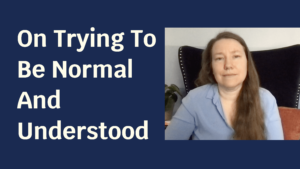Let’s start with a story
A friend emailed me recently about his experience in a job interview, which he has given me permission to share:
“I had an “autistic moment” during an interview this week. Most times I don’t think I feel much different than neurotypicals…but during the interview I honestly could not sort out the questions and the way the interviewer was talking. It really felt like they were speaking a completely different language. It was so bad that I was rephrasing and asking the questions back to them so I could understand…..I think they thought I was dense and I started to as well. 🙂 I’m curious if it’s how I interpret the way some people talk, their facial expressions, the context/environment/setting of the conversation, who knows. Anyway, I thought that was funny enough to share with you.”
Sadly, this experience is not an isolated incident. I’ve heard stories like this from other autistics and even a few neurotypicals who get freaked out by interviews.
I have a few thoughts on what might be going on in these types of interviews that can make them so challenging.
High stress means low brain function
To start with, when stakes are high, stress goes up, which means brain function goes way down. And interviews are often high stakes. You’ll get the job or you won’t. Or the promotion. The scholarship or grant. The whatever it is you’re interviewing for. It is often something you want badly and there’s no do over. So the brain responds by feeding you cortisol and adrenaline as if your life depended on it, because part of you thinks it does.
Your basic brain functions and nervous system don’t know the difference between losing the job opportunity and losing your life. And when you’re in a race for your physical life, you don’t need to think clearly, you just need to get away from the tiger (or whatever it is).
So the higher reasoning portions of your brain literally start shutting down while you’re sitting in a chair in an air conditioned office facing a person who is doing nothing more threatening than making sounds with their mouth and listening with their ears.
Unless you’re a journalist…
Secondly, interviews are a very specialized subset of social skills that even neurotypicals often find intimidating, unnatural, and don’t have much experience with. For those of us on the spectrum, the difficulty compounds.
It’s such a weird thing that our society requires people to display such a unique skill set (interviewing) in order to determine whether you can do an entirely unrelated job.
They often justify it as seeing if you “fit into the team” or “have good people skills,” but interview skills are not normal socialization skills. Unless you’re a journalist, you’re never going to talk to people like that in any other situation.
Anxiety’s perfect storm
My last thought is that interviews are a perfect storm of anxiety producing mechanisms.
Not only do they put you in a highly unusual environment and then ramp up the stakes, they give you very little useful feedback about how to perform better the next time.
So even if you get the job, you won’t know if it’s because of your brilliant interviewing skills, if you were the best qualified person despite mediocre interviewing skills, or if you were the only person who applied.
And if they pick someone else, you likewise won’t know why.
Oh, you can guess. You can assume. You can think back and ruminate on all the things that you could have done better. But you will likely never know for sure.
The person they picked might have been better qualified, or the company hired someone they were already planning on hiring but had to go through a public job search for legal reasons, or they made a different decision about the position, or the interviewer might have had unconscious bias against something else about you besides your interviewing skills.
Whether or not it was something you did or said, your performance is the only piece of the puzzle that you will ever see.
But since the human brain likes to understand why, and the only answer we have is the part that we said and did, the brain latches onto that as the only answer.
When you assume you’re the problem, yet you have no idea what you could do better, all you can do is keep doing what you’ve been doing, and are likely to keep getting similar results. So you start dreading the next scheduled failure, er, I mean, interview. Hence, anxiety.
How to get better
All that said, there is hope. Even if it really was your interviewing skills, interviewing is a skill just like any other, and you can get better at it. What it takes is a lot of practice and useful feedback when your employment isn’t on the line.
Because interviewing is a highly specific social skillset, most people don’t have natural opportunities to practice in regular life, but you can seek out classes, role play with a friend or parent, get a coach, or read advice online.
The more practice you get, in low stakes situations, with clear feedback about what you can do better, the better you will get and the less your brain will consider this a threatening situation. That’s when, in a real interview, you’ll be more likely to keep access to all of your brain functions, so you can use the skills you’ve practiced to get that job.
What do you think? Does this make sense? You’re welcome to share in the comments below.




